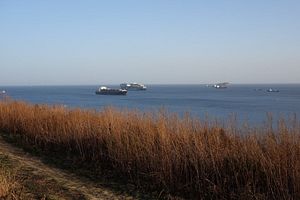On Wednesday, a U.S. Navy destroyer sailed through Russian-claimed waters off the Sea of Japan, in Peter the Great Bay off the Russian port city of Vladivostok, in a freedom of navigation operation (FONOP). USS McCampbell, an Arleigh Bukre-class guided missile destroyer, sailed through part of Peter the Great Bay.
According to a statement by a U.S. Navy official, the FONOP is the first of its kind in the area since 1987. It comes amid renewed tensions between the United States and Russia in the Black Sea, where Russia seized multiple Ukrainian vessels in the Kerch Strait last month, and as the two sides trade accusations over the Intermediate-Range Nuclear Forces Treaty.
“McCampbell sailed in the vicinity of Peter the Great Bay to challenge Russia’s excessive maritime claims and uphold the rights, freedoms, and lawful uses of the sea enjoyed by the United States and other Nations,” Navy Lt. Rachel McMarr, a Pacific Fleet spokesperson, said in a statement provided to CNN, which first reported on the operation.
The United States does not recognize Russia’s claims to the entirety of Peter the Great Bay. International law — specifically the United Nations Convention on the Law of the Sea, which Russia is a party to and the United States an unratified signatory to — provides for territorial seas extending for 12 nautical miles from a coastal states’ territory. Russia’s claim is based on a baseline drawn across the mouth of Peter the Great Bay and extending the 12 nautical mile zone out from that baseline.
Vladivostok, notably, is the headquarters for the Russian Pacific Fleet. The current Pacific Fleet’s predecessors, going as far back as the Imperial Russian Navy, have been headquartered in the region.
U.S. naval officials have repeatedly insisted that U.S. FONOPs are country-agnostic and focus on excessive maritime claims wherever they may be. In the South China Sea, despite perceptions that U.S. FONOPs have been exclusively conducted against Chinese claims, the U.S. Navy has also challenged excessive maritime claims made by U.S. allies and partners, including the Philippines and Vietnam.
“These operations demonstrate the United States will fly, sail and operate wherever international law allows,” McMarr said, according to CNN. “That is true in the Sea of Japan, as in other places around the globe.”
Wednesday’s operation came amid reports that the United States was considering moving a Navy warship into the Black Sea in connection with last week’s incident in the Kerch Strait. In 2014, Russia annexed Crimea from Ukraine and has since been providing support to separatist forces against the Ukrainian government.

































